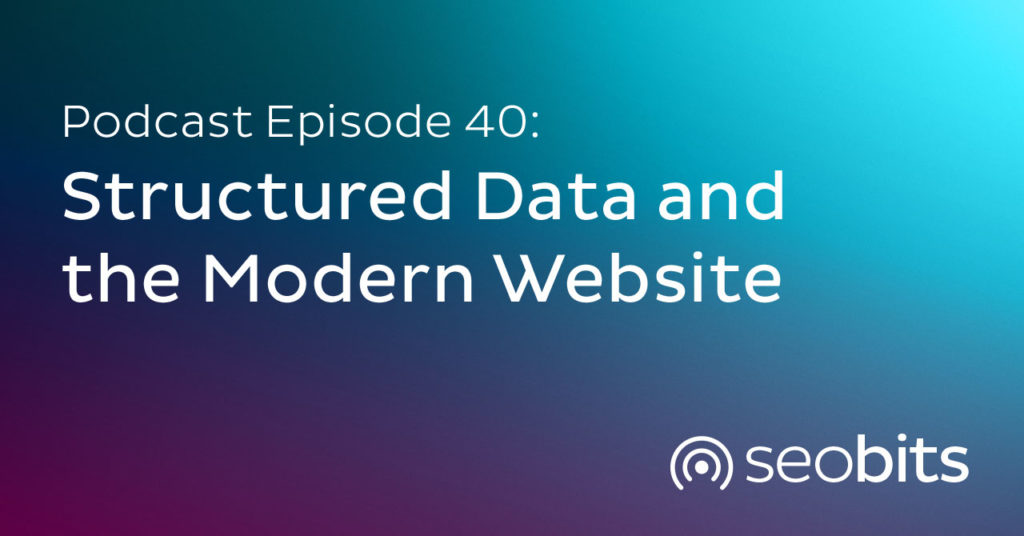In this podcast episode, Rebecca reviews the importance of using structured data in website development and SEO efforts. She covers what it is, how Google and Bing use it, and why it matters to SEO and overall ranking.
What is Structured Data?
Structured data is a systematic approach to connecting data points together. It helps search engines categorize and index content in a much more meaningful way.
Google and Bing both use structured data that is based on schema.org vocabulary. Schemas are a set of types that are arranged in a hierarchy and each type has an associated set of properties. The core schema vocabulary (not industry specific) currently consists of 598 types, 862 properties, and 114 enumeration values.
You use the schema.org vocabulary along with the Microdata, RDFa, or JSON-LD formats to add information to your Web content. Google’s preferred method of implementation is JSON-LD.
Using the extension mechanism the core vocabulary is extended to create some very nice industry-specific solutions:
- Automotive – auto.schema.org
- Bibliographic – bib.schema.org
- Health and Lifesciences – health-lifesci.schema.org
- Internet of Things – iot.schema.org
More will arrive and this is just a start of things to come.
Note: If you’d like to learn more about healthcare and life sciences schema markup, you can visit a blog post written by Rebecca on emagine.com.
Why Structured Data Matters
Search engines, and their massive indexes of content, need to organize large amounts of data. Google, for example, has reviewed over 130 trillion web pages. That is a lot of content to crawl, digest, index, and rank for the search engine results pages (aka SERPs).
As the web grows, and search engines will continue to crawl more and more URLs. The need for structured data will be increasingly important, as will its usage by everyday webmasters and marketers.
When a search engine crawler goes to a traditional web page it will find unstructured content, images, and links. In many cases, this is just standard HTML, PHP, and CSS code that is used for displaying content. This regular HTML code creates visible content, but it is completely unstructured.
Search engine still can’t see a page like we humans can see a page. When structure data is applied to content, a search engine crawler doesn’t just see text and code. The search engine now discovers data sets, entities, types, properties, values, and actions. It sees a colorful world full of details that help it digest this content, relate it to the real world, and position in search to perfectly match up to a human’s search queries.
How Google Uses It
Google describes it’s use of structured data as:
“Google Search works hard to understand the content of a page. You can help us by providing explicit clues about the meaning of a page to Google by including structured data on the page. Structured data is a standardized format for providing information about a page and classifying the page content. Google uses structured data that it finds on the web to understand the content of the page, as well as to gather information about the web and the world in general. Google Search also uses structured data to enable special search result features and enhancements.”
Google currently used structured data to support the following advanced search results (aka rich results) in SERPs:
- Articles
- Books
- Breadcrumbs
- Corporate contacts
- Courses
- Datasets
- Events
- Fact checks
- Job postings
- Livestreams
- Local businesses
- Logos
- Music
- Occupations
- Podcasts
- Products
- Q&A pages
- Recipes
- Reviews
- Sitelinks Searchbox
- Social profiles
- TV & movies
- Video
- Voice search (speakable text)
How Bing Uses It
Bing also uses structured data and states:
“At Bing, enabling users to make key decisions through visually appealing, information-rich search results is a key component of our search experience. As a content publisher, you can contribute to – and stand out in – this experience by annotating your structured content using any of the following supported specifications such as HTML Microdata, Microformats, RDFa, Schema.org, Open Graph, and JSON-LD. Annotating your data doesn’t actually change the visible content, but it does gives Bing valuable information on the type of content you’re hosting on your site. On our side, we put your annotations to good use, for example by using them to increase the visual appeal of your search results, or to supplement and validate our data sources.”
Bing currently supports markup for:
- Breadcrumbs
- Organizations
- Events
- People
- Products
- Offers
- Recipes
- Reviews
- Fact checking
Today’s Takeaway
Structured data usage is growing and it is driving more and more search results. Marketers need to take the time to learn about, implement it, and embrace it as a core part of SEO moving forward.
Today’s Episode Sponsor
A big thank you to Scripted.com for sponsoring season three of the SEObits podcast!
I’m very particular about who can sponsor our show and who I’ll put my name behind, however, today’s podcast sponsor won me over when I did a walk-through of their Cruise Control content offering. They had all the core ingredients for attracting search engines and appealing to the real humans we all want to convert.
Effective content marketing takes hard work, time, and expertise. The Cruise Control package offers all three. Don’t let content get in the way of achieving your SEO goals. Get help from the talented team at Scripted.com.
If you’re interested in the Scripted.com offering, just head on over to scripted.com/seobits so you can review the special offer for listeners.
